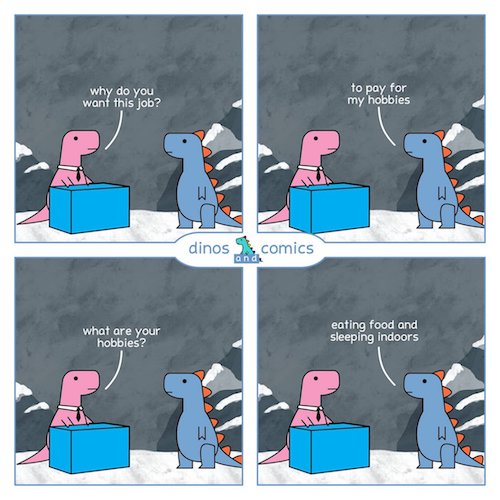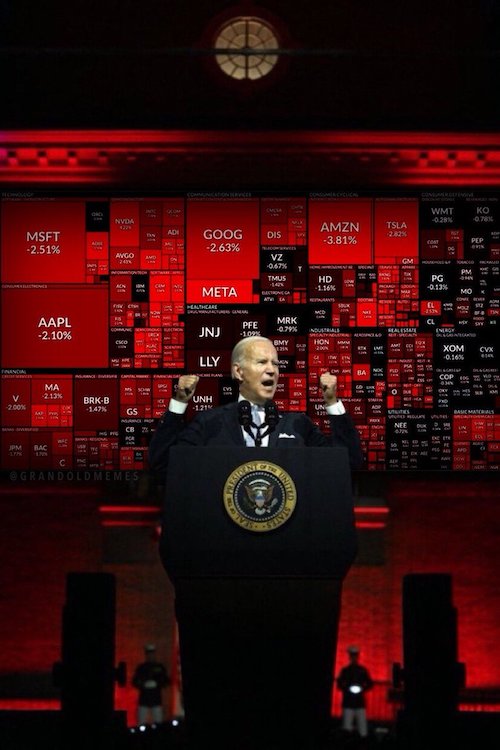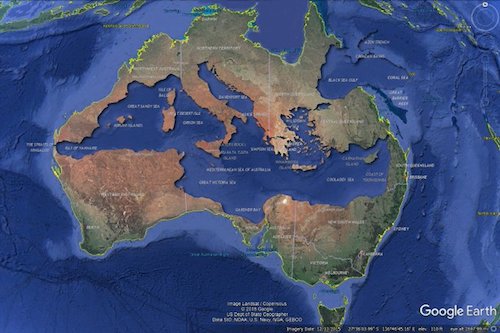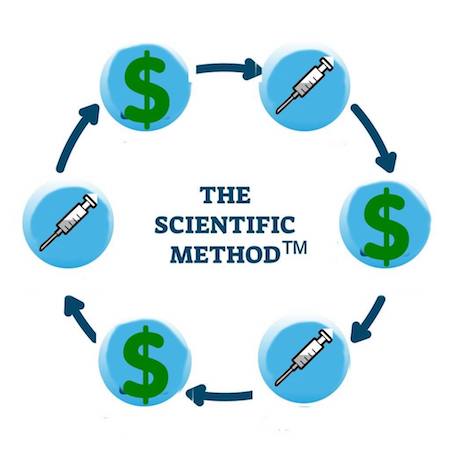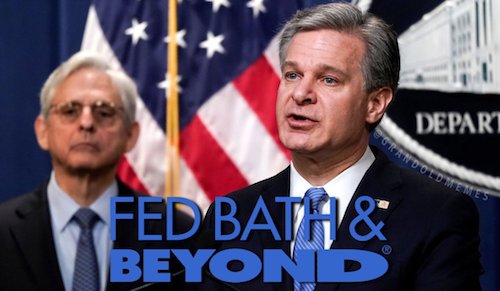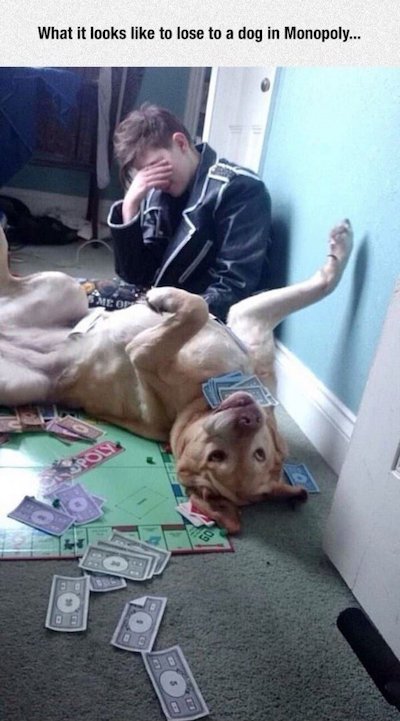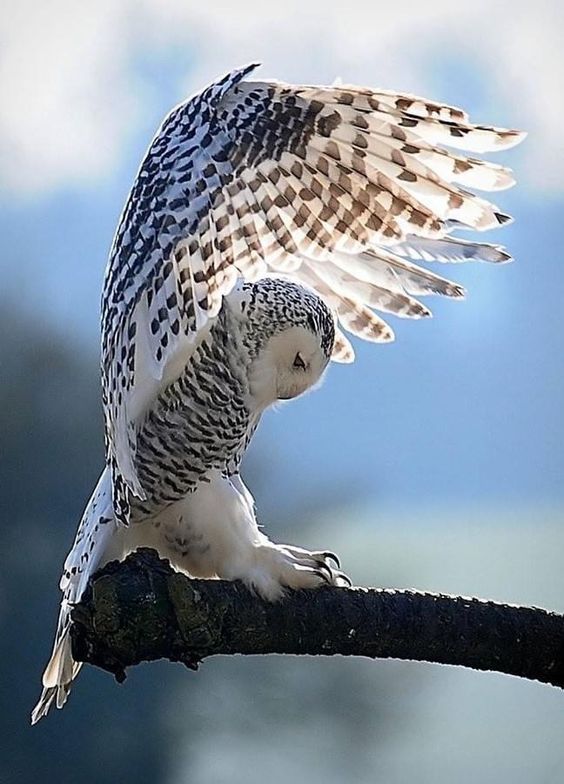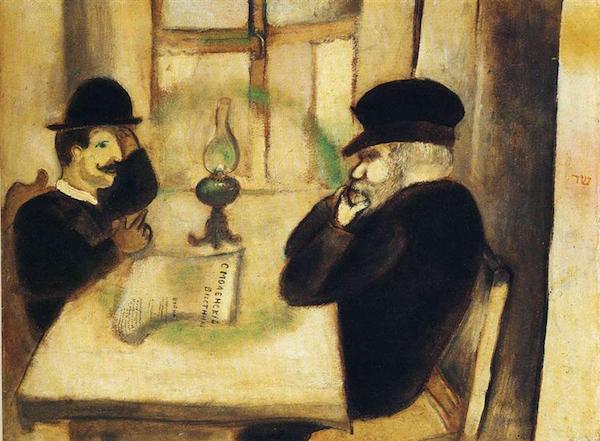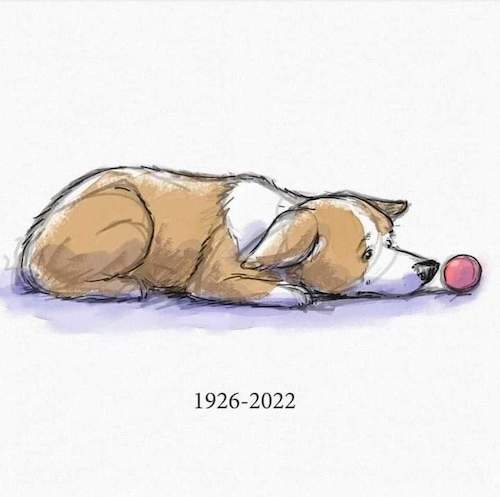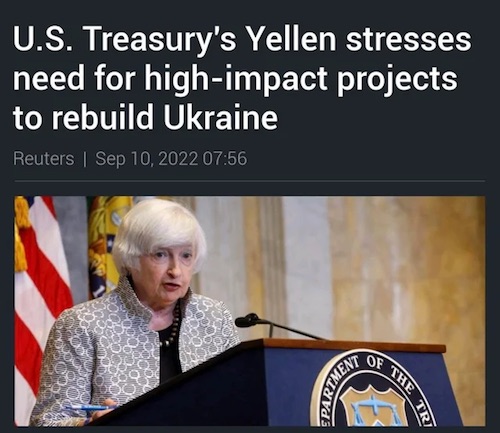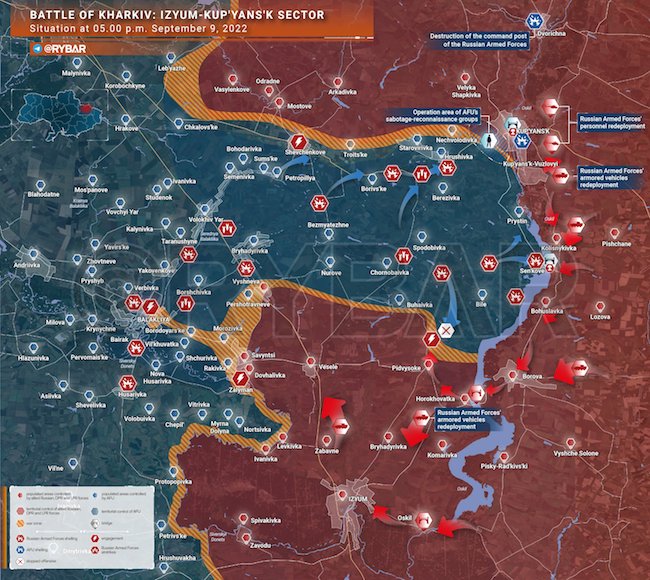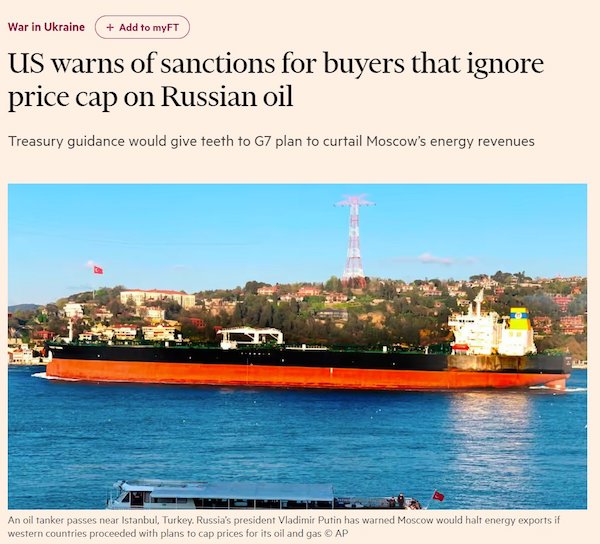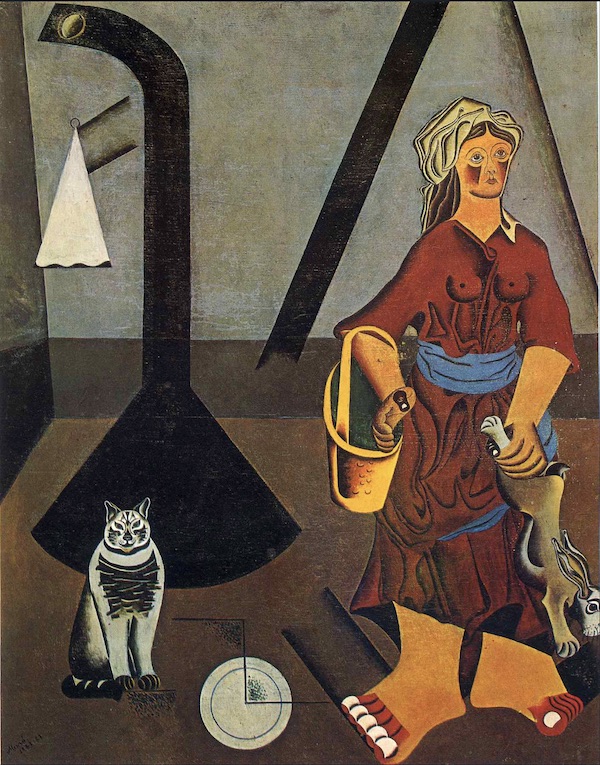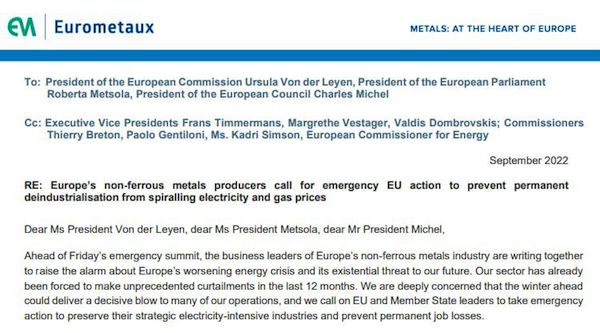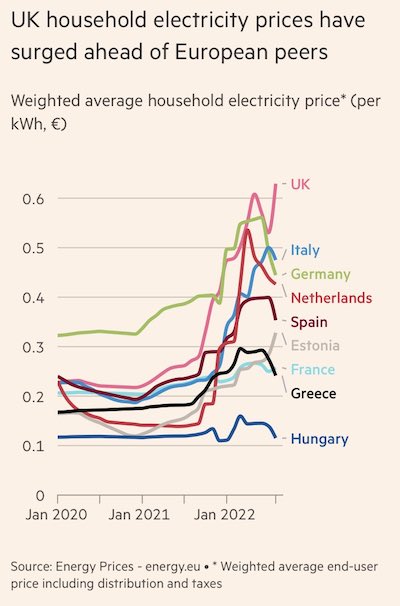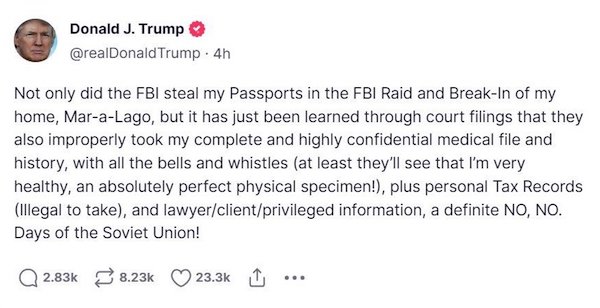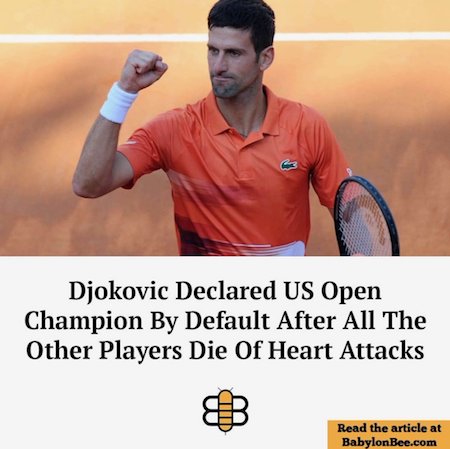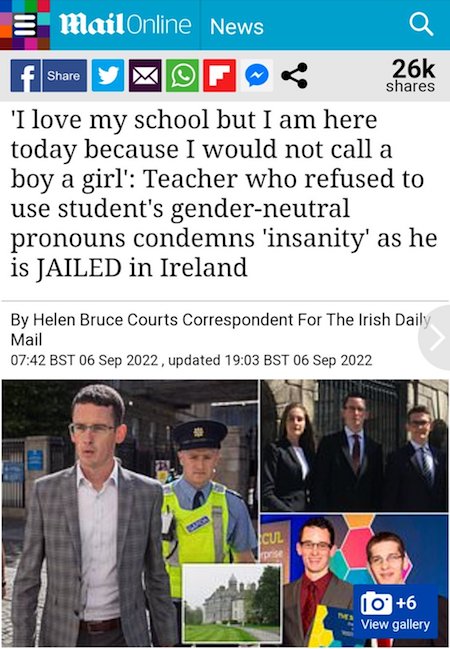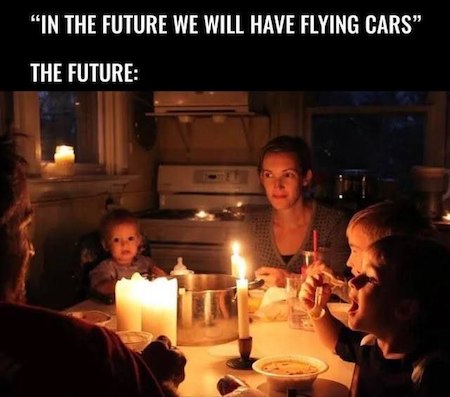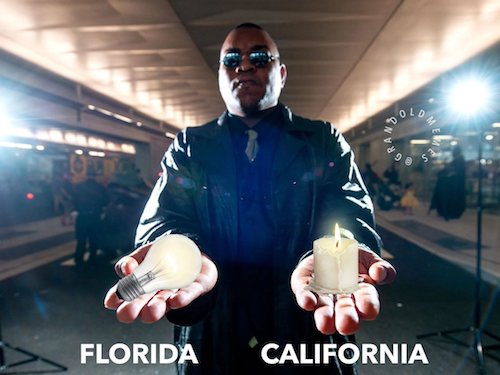
Edward Hopper Tables for ladies 1930

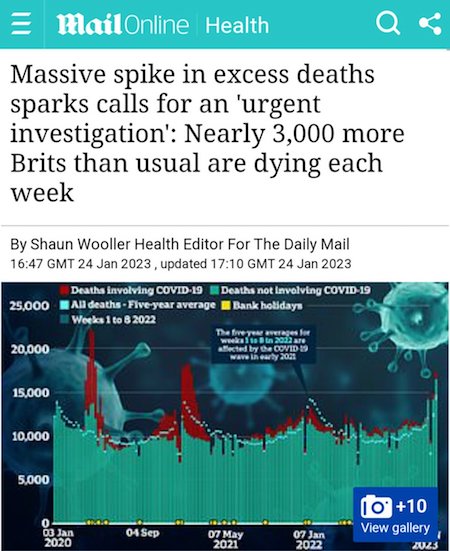

UK excess deaths- crickets
We need an urgent and thorough investigation into excess deaths. pic.twitter.com/2jhz4zy027
— Esther McVey (@EstherMcVey1) January 24, 2023



Vaccine dead
https://twitter.com/i/status/1617632284902932481

Truth Justice
BREAKING NEWS: U.S. District Attorney's and U.S. Sheriffs working together to criminally charge Anthony Fauci, Ralph Baric, Peter Daszak and many others for racketeering, collusion in creating the Wuhan virus and premeditated murder of thousands by Remdesivir and Covid Vaccines. pic.twitter.com/1iikpMHFAX
— Truth Justice ™ (@SpartaJustice) January 23, 2023

Chief of Staff
Biden's new chief of staff curiously saw his wealth explode as Covid czar pic.twitter.com/YYur6xW5W7
— Wittgenstein (@backtolife_2023) January 25, 2023


The idea has become popular that Russia doesn’t care about losing its soldiers. That supposedly balances the fact that Ukraine truly does not.
• Germany: Ukraine Losing Hundreds of Soldiers Every Day (Antiwar)
The German foreign intelligence service assesses that Kiev is losing a “three-digit number” of soldiers daily, according to a report in Der Spiegel. Berlin informed politicians of the assessment during a secret meeting this week. Germany’s Federal Intelligence Service (BND) is “alarmed” by the high number of losses Ukraine is suffering. The report says Berlin believes Ukraine was losing a three-digit number of soldiers every day during the battle of Bakhmut with Russian forces. The BND informed German politicians of the high number of injured and killed Ukrainian forces during a covert Bundestag meeting last week. The BND believes the Ukrainian casualties will have severe consequences during future battles. The German intelligence service also believes that Russia is suffering high casualties and using its soldiers as “cannon fodder.”
Reuters reported officials in Washington believe Kiev spent significant resources attempting to defend Bakhmut. The White House is currently advising Ukraine not to launch any major counteroffensives to recapture the city. The Joe Biden administration is additionally advising Kiev that continuing to pour soldiers into defending Bakhmut is preventing Ukrainian forces from attacking Russians defending other cities. Ukraine is seeking tanks from its NATO partners. However, many countries, including the US and Germany have resisted sending their modern tanks to Ukraine. Bakhmut is located in the Donetsk region. The BND believes if Russia takes the city, it will open the door for additional gains. Bakhmut has seen fierce fighting for several months, but the intensity picked up last week. Russian forces have made some gains in the city.



As I said: assisted suicide.
• The Nightmare of NATO Equipment Being Sent to Ukraine (Scott Ritter)
The most recent convocation of the Ramstein Contact Group took place in the shadow of an interview given by the commander of the Ukrainian Armed Forces, General Valerii Zaluzhnyi, to The Economist, in December 2022. According to Zaluzhnyi, the primary problem facing Ukraine was the need “to hold this line [i.e., the Soledar-Bakhmut defensive belt] and not lose any more ground.” Since that interview, Soledar has fallen to the Russians, and Bakhmut is threatened with being surrounded. Moreover, Russian forces are on the offensive north and south of the Bakhmut front, in some instances advancing up to seven kilometers per day. Zaluzhnyi also stated that the second priority for Ukraine was “to get ready for this war which can happen in February [2023]. To be able to wage a war with fresh forces and reserves.
“Our troops are all tied up in battles now, they are bleeding. They are bleeding and are being held together solely by courage, heroism, and the ability of their commanders to keep the situation under control.” The Ukrainian commander noted that the February “war” would have Ukraine resuming the attack: “We have made all the calculations — how many tanks, artillery we need and so on and so on. This is what everyone needs to concentrate on right now. May the soldiers in the trenches forgive me, it’s more important to focus on the accumulation of resources right now for the more protracted and heavier battles that may begin next year.” The goal of this offensive, Zaluzhnyi said, was to push Russia back to the borders that existed on Feb. 23, 2022, the start of the Russian invasion. He also indicated that the liberation of Crimea was an objective.
“In order to reach the borders of Crimea, as of today we need to cover a distance of 84 km to Melitopol [a strategic city in the south of the Donetsk Republic]. By the way, this is enough for us, because Melitopol would give us a full fire control of the land corridor, because from Melitopol we can already fire at the Crimean Isthmus.” Zaluzhnyi exuded confidence. “I know that I can beat this enemy,” he said. “But I need resources. I need 300 tanks, 600-700 IFV’s [infantry fighting vehicles], 500 Howitzers. Then, I think it is completely realistic to get to the lines of February 23rd.” Zaluzhnyi spoke of an upcoming meeting with U.S. General Mark Milley, chairman of the Joint Chiefs of Staff. “I will tell him [Milley] how much it is worth, how much it costs. If we don’t get it, of course we will fight to the end. But as a movie character said, ‘I don’t vouch for the consequences.’ The consequences are not hard to foresee. This is what we have to do.” In short, Zaluzhnyi was saying he could win the war with Russia if he received the requested amount of military equipment. Otherwise, Ukraine would likely lose the conflict.
The End of NATO – Macgregor/Ritter

With hardly any training.
• US and Germany Ready To Send Tanks To Ukraine – Reports (RT)
After months of reluctance, the US and Germany reportedly plan to send tanks to Ukraine, in what Kyiv hopes will be a game-changer on the battlefield. US President Joe Biden’s administration is expected to announce plans to send at least 30 M1 Abrams tanks. German Chancellor Olaf Scholz has also reportedly decided to send at least 14 Leopard 2 tanks. Russia’s ambassador to the US blasted the news as “another blatant provocation”. Ukrainian officials have said such shipments could help its forces seize back territory from the Russians. Until now, the US and Germany have resisted internal and external pressure to send their tanks to Ukraine. Washington has cited the extensive training and maintenance required for the high-tech Abrams.
Berlin has expressed caution about Nato becoming a direct party to the war with Russia. Citing anonymous sources, US media outlets are reporting that an announcement regarding Abrams shipments to Ukraine could come as soon as Wednesday. Unnamed officials were cited as saying at least 30 of the vehicles could be sent. The timeline of any potential delivery, however, remains unclear, and it could take months or even years for the US combat vehicles to reach the battlefront. According to US media reports, German officials had privately insisted they would only agree to the transfer of Leopard 2s to Ukraine if the US also sent M1 Abrams.
“If the Germans continue to say we will only send or release Leopards on the conditions that Americans send Abrams, we should send Abrams,” Democratic Senator Chris Coons, a Biden ally, told Politico on Tuesday. Britain has already said it will send Challenger Two tanks to Ukraine. Poland this week said it wants to send Leopard 2 tanks to Ukraine, but they are made in Germany and so Berlin needs to approve their export. At least 16 European and Nato countries have the Leopard 2 tanks, according to the International Institute for Strategic Studies. Not all will send tanks to Ukraine – but Mr Scholz’s apparent decision now means they can, should they wish.

“The report says the equipment will be purchased from contractors rather than drawn from existing US stockpiles.”
Big Serge: “Now the Washington Post claims that the Abrams going to Ukraine may be a new order from the manufacturer, rather than from US stocks. If so, the war might be over before they reach Europe. In any case, seems clear that this wasn’t well thought out.”
• Biden To Announce Deliveries Of Abrams Tanks To Ukraine On Wednesday (TASS)
US President Joe Biden will make a formal announcement about the deliveries of Abrams tanks to the Kiev government on Wednesday, Al Jazeera reported citing an unnamed US administration official. “President Biden will announce his decision to supply Abrams tanks to Ukraine tomorrow, on Wednesday,” the TV channel reported on Tuesday night. According to the channel’s source, the tanks will be contracted, not taken from the Pentagon’s arsenals. The Wall Street Journal reported on Tuesday citing US officials that the US Administration is inclined to ship a significant number of M1 Abrams tanks to Ukraine, adding that the announcement of these shipments could be made this week already.
According to the WSJ, this step would become a part of the agreement with Germany, which includes shipment of a small number of Leopard 2 tanks to Kiev by Berlin itself, as well as Germany’s approval of shipment of these German-made tanks by Poland and other countries. Later in the day, the Politico newspaper reported citing US administration sources that the United States may send at least 30 M1 Abrams tanks to Ukraine as military aid. Two sources told the paper that an announcement on the subject may be made later this week. The report says the equipment will be purchased from contractors rather than drawn from existing US stockpiles.

“..the only way to lasting peace is to make clear that Russia cannot win on the battlefield..”
• Stoltenberg: Putin Is Planning For New Offensives (Az.)
Putin is planning for new offensives, and there are no indications he has changed his goal of controlling Ukraine, so the only way to lasting peace is to make clear that Russia cannot win on the battlefield, NATO Secretary General Jens Stoltenberg told a meeting with Defence Minister Boris Pistorius, Report informs, referring to the NATO’s website. He stressed that the only way to lasting peace is to make it clear to Putin that he will not win on the battlefield: “Therefore, we must provide heavier and more advanced systems so that the Ukrainian forces are able to repel the Russian forces.

We see this a lot with Ukraine: accuse the other side of exactly what you are doing. It’s a well-known tactic. But really, how do you sell this idea, when Merkel, Hollande, Poroshenko have all said they cheated on Minsk? You just say no, Putin cheated, and then that becomes true?
• Ukraine Advises West On How To Negotiate With Russia (RT)
Ukrainian Foreign Minister Dmitry Kuleba has claimed that Kiev negotiated in good faith for years, while Moscow used the Minsk process mediated by Paris and Berlin to buy time for war. He also argued the West is not enough for peace, which can only come when the Global South sides with Ukraine. “For eight years, Ukraine and the West tried to end the war by means of politics and diplomacy,” Kuleba argued in a Politico op-ed on Tuesday, titled “How Not to Negotiate with Russia.” The Minsk process, initiated in 2014 by France and Germany, saw Ukraine agree to “years of fruitless negotiations” in order to “avoid escalation and preserve peace in Europe,” he wrote.
“While we were holding back, Russia was building up,” Kuleba said, claiming that Moscow was “preparing for a full-scale war on Ukraine” all along, in order to “destroy the democratic international order with a single devastating blow.” Ukraine fully adhered to the Minsk process, while Russia “never sought fair peace and fair play,” Kuleba claimed. The claims, for which Kuleba provided no evidence, contradicted the recent testimonies by German and French leaders at the time, as well as Ukraine’s own former president. Former German chancellor Angela Merkel said last month that the purpose of Minsk was to “give Ukraine valuable time” to build up its military. Former French president Francois Hollande confirmed this to Ukrainian media at the end of December.
Pyotr Poroshenko, who ran Ukraine between 2014 and 2019, said openly in June last year that Minsk “meant nothing” and was a ploy to “delay the war – to secure eight years to restore economic growth and create powerful armed forces.” In Kuleba’s Politico history, none of this happened. Instead, the Ukrainian foreign minister claimed that “deception lies at the core of Russia’s foreign policy and the way it treats international partners — both in Europe, Africa, Asia and other regions” and that Moscow prefers to talk with “victims, weaklings, henchmen.”
On Monday, former Russian president Dmitry Medvedev warned Moscow’s diplomats that the West was “trying to enlist as many votes as possible in support of their anti-Russian initiatives, using underhanded means such as economic pressure, extortion and political bribery.” In Tuesday’s editorial, Kuleba claimed that “the voice of the West is not enough” to restore global security, and that peace in Ukraine now hinged on the countries of “Asia, Africa, the Middle East and Latin America stepping up and using their weight and influence” at places like the UN, where their votes counted.

“Since Zelensky’s government is not in control of its own foreign policy, it makes no sense talking with him, Lavrov suggested..”
• Kremlin Comments On Direct Contact With Zelensky (RT)
Russian President Vladimir Putin has not spoken to his Ukrainian counterpart for a number of years, his spokesman has confirmed. Dmitry Peskov was asked about contact between the two leaders by RIA Novosti during a press conference. The news agency referred to the Russian president’s public itinerary, which suggests he last met Zelensky in person during “Normandy format” talks mediated by France and Germany in 2019. The following year, they spoke by phone twice, in February and June. Russian Foreign Minister Sergey Lavrov had previously revealed that Moscow and Kiev were on the verge of signing a truce during the early stages of the conflict on terms suggested by the Ukrainian side. However, the process was stopped by Kiev’s Western sponsors, who want to prolong the conflict to harm Russia, he said.
Since Zelensky’s government is not in control of its own foreign policy, it makes no sense talking with him, Lavrov suggested. And, in any case, talks with Russia are currently banned under Ukrainian law, he added. The Russian diplomat was referring to an order of the Ukrainian national security council prohibiting any negotiations with Moscow so long as Putin remains in power. Zelensky signed it into law in October. Ukraine agreed to a 2014-2015 peace roadmap as a ploy to rebuild its army, according to its former president Pyotr Poroshenko and the leaders of Germany and France at that time, Angela Merkel and Francois Hollande. The same approach was apparently used for the peace negotiations last year, which were partially mediated by Türkiye. Kirill Budanov, the head of Ukrainian military intelligence, confirmed last week that he had used an asset in Ukraine’s team of negotiators to stall the process and win time for a military regrouping.

“We declare once again that we will be ready to consider new sound ideas on this matter, should our US counterparts present any..”
• Potential For Arms Control Dialogue With US Still Exists – Russia (TASS)
Russia proceeds from the understanding that it is still possible to resume and develop a dialogue with the United States on future arms control, including with the participation of all key actors, Russia’s permanent representative at the UN office in Geneva Gennady Gatilov said at the annual session of the Conference on Disarmament on Tuesday. “We believe that the understanding the Russian and US delegations reached in Geneva in 2021 has left the door open for resuming and developing a comprehensive and substantive dialogue on future arms control, including with the participation of all key actors,” Gatilov said.
“Although Russian-US consultations are still frozen through the fault of the United States, sooner or later we will still have to work out a new global ‘security equation’ that will incorporate all significant factors of strategic stability, such as the whole range of offensive and defensive weapons, deployed and non-deployed and nuclear and non-nuclear ones, capable of influencing the balance of power and the situation in the field of international security,” Gatilov said. “We declare once again that we will be ready to consider new sound ideas on this matter, should our US counterparts present any,” he stressed.
Gatilov drew attention to the fact that the world was struggling through “a period of profound transformation, accompanied by an upsurge of conflict potential, instability and unpredictability.” In a situation like this “collective efforts united by a common goal – to make the world safer in the field of arms control, disarmament and non-proliferation are needed more than ever,” Gatilov stated.

And will now declare once again that Ukraine is corruption free.
• Kiev Fires Many Of Its Officials Amid Corruption Scandals (RT)
Multiple senior Ukrainian officials were relieved of their duties by the country’s government on Tuesday. The ongoing reshuffle was announced by Ukrainian President Vladimir Zelensky in his daily video address and affects officials “on different levels, in ministries and other bodies of central and provincial authority, and law enforcement.” The government has dismissed deputy defense minister Vyacheslav Shapovalov, deputy social policy minister Vitaly Muzychenko, as well as two deputies of the minister of regional development, Vyacheslav Negoda and Ivan Lukerya. Shortly before the government’s decision, Shapovalov himself announced his resignation, which was swiftly accepted by his boss, Alexey Reznikov. The move has been prompted by an ongoing graft scandal within the ministry, which had allegedly been procuring food for troops at abnormally high prices.
“Vyacheslav Shapovalov, who was in charge of the logistics of the Armed Forces of Ukraine, asked to be dismissed so as not to pose a threat to a stable supply of the military as a result of a campaign of accusations related to food procurement,” the defense ministry said in a statement, branding the allegations “unreasonable and baseless” and lauding Shapovalov’s resignation as an “honorable deed in line with traditions of European and democratic politics.” According to a Ukrainian media investigation that emerged over the weekend, various foodstuffs for the military ended up costing several times more than the average prices offered by retailers. Reznikov has rejected the allegations, stating the documents cited in the investigation were inaccurate and some prices ended up inflated due to a “technical error.” The minister also rubbished the comparisons with consumer prices, insisting that military procurements include costs that retail ones do not.
Apart from the deputy ministers, the government has also dismissed multiple heads of regional military administrations, including Aleksey Kuleba, the head of Kiev Region. According to reports by some Ukrainian outlets, Kuleba is poised to replace Zelensky’s deputy chief of staff, Kirill Timoshenko, who resigned earlier in the day. Deputy Prosecutor General Aleksey Simonenko became another victim of the ongoing reshuffle, ending up dismissed on Tuesday as well. The official became embroiled in a public scandal earlier this month, after spending the New Year’s holidays in Spain. Apart from getting bad publicity for relaxing at a foreign resort during the ongoing military conflict with Russia, the official faced allegations of corruption as he’d purportedly used the car of a wealthy businessman with a security detail hired by its owner during the ill-fated trip.

“Potanin nevertheless expressed confidence that the West “will come to their senses” sooner or later..”
• Western ‘Theft’ Will Backfire, Russian Tycoon Warns (RT)
Western countries are sawing off the branch they are sitting on by confiscating Russian assets, billionaire businessman Vladimir Potanin believes. Following the launch of Russia’s military operation in Ukraine in February last year, multiple countries have frozen assets belonging both to the Russian state, and private companies and individuals to the tune of more than $300 billion. In an interview with Russian media outlet RBK published on Monday, Potanin, the largest shareholder of mining giant Nornickel, said: “The confiscation [of assets] is a covert or overt form of theft,” and destroys “the investment climate of the jurisdiction where this is happening.”
Potanin noted that the countries comprising the ‘collective West’ had based their societies upon respect for private property. The recent freezing of Russian assets “will backfire on them,” he said, adding that Russia should refrain from mirroring these measures. He went on to suggest that by exercising respect for property rights, Moscow will be in a stronger moral position when it fights for its frozen assets in the West, and will send the right signals to entrepreneurs at home. Potanin also warned against nationalizing property left behind in Russia by Western businesses – instead, the authorities need to “give the investment community the opportunity to solve this problem on its own.”
He noted that the exodus of Western companies from Russia has allowed local investors to buy up assets at relatively low prices. Potanin described the Western sanctions as “absolutely destructive and even, apparently, absolutely illegal,” and in his view, what we are seeing right now is the destruction of basic global rules. The billionaire acknowledged that Western sanctions have put his plans for overseas business expansion on hold and have adversely affected his ability to travel the world, though he has now switched to exploring Russia instead, he added. Potanin nevertheless expressed confidence that the West “will come to their senses” sooner or later.

And there is Potanin again…
• Over 90% Of Western Firms Have Remained In Russia (RMX)
Only 8.5 percent of all EU and G7 companies have actually left Russia, according to research from the University of St. Gallen and the IMD business school in Lausanne, Switzerland. Before the outbreak of war, there were more than 2,400 company branches and 1,400 companies from the EU and G7 operating in Russia. By the end of November last year, only 120 companies had left Russia or sold their company there. The research indicates that the news of a mass exodus of Western firms from Russia has been largely exaggerated. In fact, businesses have resisted calls from governments, media, and civil society, according to the Belgian daily newspaper Het Laatste Nieuws. Companies remain skeptical and reluctant about leaving Russia over fears of losing their business and staff.
Those who have left have ended up transferring assets into Russian hands, even for a single symbolic ruble or euro, as was the case with Renault and Nissan. According to Forbes, the biggest beneficiary was oligarch Wladimir Potanin, whose Interros company bought Rosbank from Societe Generale, making nearly 50 billion rubles (€667 million) in the process. The second-biggest earner was Vladyslav Sviblov, whose Highland Gold Mining bought the assets of Canada’s Kinross corporation, which netted him almost 40 billion rubles. Not far behind was Ivan Tirishkin from SPB, who bought 49.5 percent of the shares in HKF-Bank LLC, making over 35 billion rubles. Fourth on the list was the state research center FSUE NAMI, which took over the plants owned by Renault and Nissan, gaining assets worth just under 35 billion rubles.

“The mechanism could potentially lower levels of market-based gas flows between the EU’s different market areas, which would lead to a less integrated internal gas market..”
• EU Gas Price Cap Threatens Market Stability – Regulators (RT)
Europe’s new gas market correction mechanism, the price cap which launches next month, is likely to affect the way the region’s exchange-traded gas markets operate, the EU’s financial and energy market regulators said in a report on Monday. According to the European Securities and Markets Authority (ESMA), market participants may change their behavior to avoid the activation of the mechanism or in order to adapt to it. “By curbing the key price discovery function of regulated markets, the mechanism will not come without consequences on market participants’ trading behavior and may have an effect on the ability of all market participants to effectively manage their risks,” ESMA said. Traders may then be forced to switch to contracts and marketplaces not affected by the price cap.
“Such adaptations could be achieved by various means, notably by shifting trading to OTC (over the counter) or to non-EU venues… It could trigger significant and abrupt changes of the broader market environment, which could impact the orderly functioning of markets, and ultimately financial stability,” the agency warned, stressing that this may also lower open interest and undermine liquidity on regulated markets for the EU’s benchmark TTF gas contracts. The EU Agency for the Cooperation of Energy Regulators (ACER) echoed this opinion in a separate report, warning that the measure could lead to the relocation of trading volumes from EU to foreign gas exchanges. The agency also said the mechanism could jeopardize energy supply if the price levels put in place by the activated cap lower the appeal of EU markets for global LNG suppliers.
“The mechanism could potentially lower levels of market-based gas flows between the EU’s different market areas, which would lead to a less integrated internal gas market,” ACER stated. EU countries agreed in December to set a price cap on natural gas, in an effort to keep energy costs from spiraling. The cap will be triggered if the TTF gas hub spot prices trade above the €180-per-megawatt-hour level ($196) for three consecutive days. The mechanism is to come into force on February 15. The measure was introduced as a way to help avoid price spikes, like the most recent one in August, when EU gas prices reached a historic high of €345 ($375) per megawatt-hour due to concerns over Russian energy supplies.

Lovely story.
• Shostakovich: The End of the Siege and the Triumph of the Spirit (Hoppe)
On 15th July 1941, impelled and galvanised by the ominous atmosphere of war and the great trepidation he felt for his motherland and his beloved city, Shostakovich began to work feverishly on the first movement of a composition that was to become his seventh symphony. The first movement of the symphony was written during a relentless bombardment of the city. Shostakovich recalled: “Neither the savage raids, nor the German planes, nor the sinister atmosphere of the besieged city could hinder the flow. I worked with an inhuman intensity that I had never achieved before.” On 2nd September, the day that the Germans intensified their bombardment of the city, Shostakovich began work on the second movement. Working at high intensity in between dashes to the nearest bomb shelter, he completed it within two weeks. On 8th September, Leningrad was locked in the fateful Siege.
On 16th September, the composer made a special radio broadcast (an excerpt of this broadcast) to encourage the soldiers at the front, saying: “An hour ago I completed the second part of my new work. If I manage to complete the third and fourth parts of this composition, and if it turns out well, I shall be able to call it the Seventh Symphony…. Despite the war-time conditions, despite the danger which is threatening Leningrad, I have written the first two parts in a comparatively short time. Why am I telling you this? I am telling you this so that listeners tuned in now should know that life in our city is normal. Despite the threat of invasion, things are going on as usual in our city. All of us are soldiers today, and those who work in the field of culture and the arts are doing their duty on a par with all the other citizens of Leningrad… Soviet musicians, my dear, numerous comrades-in-arms, my friends! Remember that grave danger faces our art. Let us defend our music, let us work honestly and selflessly… Comrades, I shall soon be completing my Seventh Symphony. My mind is clear and the drive to create urges me on to conclude my composition. And then I shall come on the air again, with my new work and shall nervously await your stern, friendly judgment. I assure you in the name of all Leningraders, in the name of all those working in the field of culture and the arts, that we are invincible and that we are ever at our posts… I assure you that we are invincible.”
That same evening Shostakovich had invited several musicians to his apartment to hear what he had written so far. After he finished the first movement, there was a long silence. An air-raid warning sounded. No one moved. Everyone wanted to hear the piece once more. But the composer briefly excused himself to take his wife Nina and their children Galina and Maxim to the nearest air-raid shelter. When he returned to his guests, he repeated the first movement to the blasts of Luftwaffe bombs and anti-aircraft fire and then proceeded to play the next movement. Their deeply emotional reactions encouraged him to start that night on the Adagio – the third part. He completed this movement on 29th September.

“In other words, the Russians also destroyed this 3rd iteration of the “Ukrainian” military (in reality NATO military)..”
• Tactics without Strategy is the Noise Before Defeat (Saker)
Furthermore, geography is a bitch and, in our case, the entire Donbass is one huge cauldron, open only on the western side, which makes it rather tricky to plan anything more than small, local, attacks. For the Russians, however, this means that they can attack from any one of these axes: from the north, the East and the South or even any combination therefore. By now, following the partial mobilization, Russia does have the figures needed to chose any option she wants. Pretty soon, the West ran out of ex-WTO weapons. The West responded by sending wave after wave of “volunteers”, PMCs, even “deserters” (like this US Navy SEAL). Recruitment offices where hastily organized worldwide and the Russian side began hearing more and more radio transmissions not on Russian or Ukrainian, but in Polish and English (and even Arabic!).
The problem now is hardware. First, NATO cannot replace “one for one” ex-WTO MBTs, IFV/APCs, SAM, etc. Not only is NATO hardware expensive, there are simply not enough stores to fully compensate for the huge losses inflicted by the Russians. Second, WTO hardware was not only familiar to the Ukrainians, but it was much easier to secure the kind of supply/maintenance flows needed to operate it than would be the case with NATO hardware (which is mostly inferior to ex-WTO kit, with a few exceptions). Third, most of NATO hardware performed terribly. None of the promised Wunderwaffen made any real difference, at least in military terms. In terms of murdered civilians, the Russians have now reported that since the delivery of long range munitions to the NATO forces in the Ukraine (because that is what they are), the number of civilian victims murdered by NATO has increased by a factor of four!
But, of course, nobody in the West cares about that. Initially, the West responded by sending all its own surplus gear, old stocks, especially against a promise by the USA to compensate for these systems sent to the Ukraine with much newer systems. Pretty quickly those stocks ended up chewed-up by the Russian meat grinder too. In other words, the Russians also destroyed this 3rd iteration of the “Ukrainian” military (in reality NATO military).

“Every thread of the Covid-19 narrative promulgated by this ass, and the sachems of the CDC and FDA, are shredded, proved to be not only lies, but deadly lies..”
• The End of Reality Consensus Disorder (Kunstler)
Elon Musk shocked the Twitterverse (and beyond) by confessing that he only took the vaxxes because international travel for business required it, and his second shot was a near-death experience (while his cousin developed myocarditis from it). Meanwhile, the UN issued a warning to him through a WEF mouthpiece, EU Commissioner for Values and Transparency, Vera Jourova: comply and regulate speech on the platform, or else…. We have the rules which must be complied with and otherwise there will be sanctions. I think that the confidence has been weakened, and I had quite a high level of confidence when it comes to Twitter. I have to say that we worked with knowledgeable people, with layers, with sociologists, who understood that they have to behave in some decent way. Not to cause really big harm to society…” she said.
Something tells me that Mr. Musk will invite these busybodies to take a flying fuck at a rolling donut. As the Tweeter @BlackFlagExpat explained: “Musk can simply set up the server capacity outside of EU jurisdiction (UK, Andorra, Switz, Russia?) and move all data to those physical and virtual servers. Then lay off all European employees and stop paying rent on all leases.” Nice! That old rats-from-a-sinking-ship feeling emanates from the hazy region where “Joe Biden” dwells. Chief of staff Ron Klain is handing over his duties to former Covid-19 “czar” Jeff Zients — who did such a swell job keeping Americans mis-and-disinformed through the heart of the “vaccine” campaign (January 2021 to April 2022). Every thread of the Covid-19 narrative promulgated by this ass, and the sachems of the CDC and FDA, are shredded, proved to be not only lies, but deadly lies.
Every angle of Covid policy was wrong, and treasonously wrong. This is who will soon be, ostensibly, leading the country — since you can be sure that “JB” is not. Nobody will believe a word that Jeff Zients utters. The mainstream media is even turning against this coterie of evil nincompoops. The sociopathic Political Left and its international managers have lost control of the ball in this game. They can insist on any sort of absurdity, but the people have stopped buying it. Resentment over all this is breaking out. Nobody wants any more boosters. The running dogs of official propaganda, such as Stephen Colbert and Jimmy Kimmel, await their career executions. The years of Reality Consensus Disorder draw to a close. The counter-revolution finally begins.

“Taxing wealth is no easy matter so the proposal seeks $660 million per year for administrative costs.”
• California Lawmakers Move to Tax People Who Have Left the State (Turley)
California lawmakers appear intent on making the Eagles song Hotel California a reality .. . at least when it comes to taxes for those who try to flee the state. At the Hotel California, “you can check-out any time you like, but you can never leave!” With soaring costs and a massive $24 billion deficit, the state is also facing an exodus of people leaving the state. The solution? Not only impose a wealth tax (which will fuel even more departures) but pursue those who left the state. The new bill introduced by Democratic Assemblyman Alex Lee would impose an extra annual 1.5% tax on those with a “worldwide net worth” above $1 billion, starting as early as January 2024. The law has a cynical bait-and-switch provision. The billionaire tax is just meant for the initial packaging and passage. It can therefore be sold as a “billionaire’s tax.”
However, in two years, the threshold drops to a worldwide net worth exceeding $50 million. While billionaires would stay at 1.5%, those in the lower tax bracket would be hit by a 1 percent added rate on worldwide assets. It also includes the taxation on those who led the state . . . many due to the high taxes. California already has the highest tax burden in the nation. It relies on its top 1% of taxpayers for roughly half of its individual income tax revenue, but continually treats those taxpayers like game in a canned hunt. The result, not surprisingly, is that they are leaving for states like Texas and Florida. The new tax would arrange for payments to California’s Franchise Tax Board for years after a departure for those assets which are not easily converted into cash.
I have previously written how the wealth tax pushed by Democrats like Sen. Elizabeth Warren are unconstitutional under the federal Constitution. States are not subject to the same limit. Not surprisingly, the highest taxing states are pursuing the most wealthy . . . who are leaving in droves. That includes Connecticut, Hawaii, Illinois, Maryland, Minnesota, New York and Washington. Under the existing exit tax, businesses and individuals must pay a one-time tax to leave based on the value of the business or individual’s assets, including property, stocks, and other investments. For those who have earned more that $30 million, you can continue to pay for years after fleeing the state. The current exit tax is 0.4% of an individuals’ net worth over $30,000,000 in a tax year, including assets located outside of the California other than real estate. Taxing wealth is no easy matter so the proposal seeks $660 million per year for administrative costs.




McCarthy
https://twitter.com/i/status/1618070257037643776

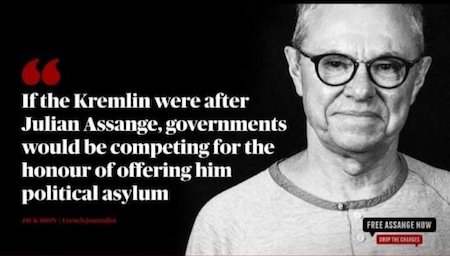




Taormina-Giardini Railway Station in Sicily.


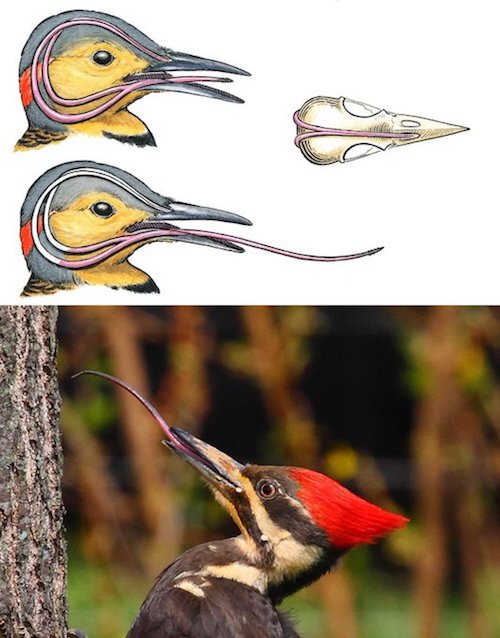
A woodpecker’s tongue is so long that it wraps around its skull to protect its brain from over 1000g of acceleration when it’s hammering away

Weather Channel
https://twitter.com/i/status/1617864670844715011



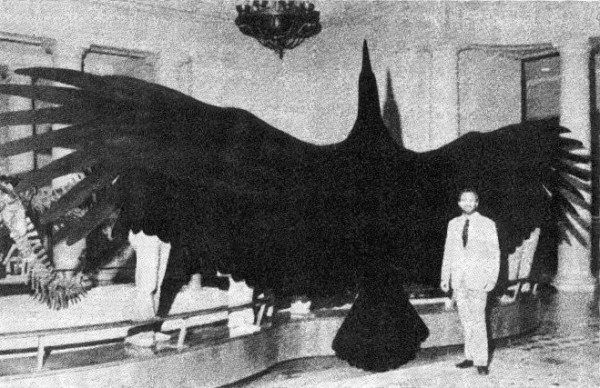
The Giant Teratorn — Argentavis magnificens — was an absolutely enormous species of flying bird which lived in Argentina during the late Miocene, about six million years ago. it possessed a wingspan probably somewhere between 6-9 meters


Baby octopuses still in their eggs


Support the Automatic Earth in virustime with Paypal, Bitcoin and Patreon.





